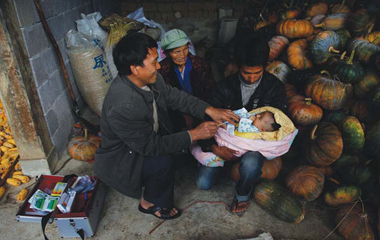General practice
Updated: 2011-01-07 10:49
By Zhang Zixuan (China Daily European Weekly)
|
|||||||||||
Country doctors work in trying conditions to bring care to people in the remotest of regions
Just thinking about hanging on a 400-meter-long zip line, swaying dangerously 50 meters above the roaring Nujiang River is scary, admits Li Jiasheng. But the 33-year-old rural doctor in Fugong county of Nujiang Lisu autonomous prefecture, Yunnan province, knows the zip line is the fastest way reach Watuwa village, on the other bank of the Nujiang Great Canyons, for his house call.
 |
|
A rural doctor from the Bai ethnic group checks a new-born baby. |
Although a Lisu ethnic native, Li, like most of the other locals, dreads every time he has to ride the zip line.
"You could become fish food as soon as you fall," smiles Li, who still bruises his legs and back when zipping from end to end on the line.
Using a steel pulley and a hemp rope looped to the line, he puts his upper body through the loop and sits on it. He then hauls his medicine box over his right shoulder, steadies his trembling legs and takes a deep breath. After pushing hard against the rock face, he is on the other side of the canyon in less than a minute.
For many villagers living in remote parts of Yunnan, a rural doctor's medicine box is all the access to healthcare they will ever have.
For the doctors themselves, it means working the longest hours in the worst conditions and for the lowest pay.
As the only doctor servicing 11 villages in Lumadeng township, Li has been working round-the-clock for the past eight years, ministering to more than 1,700 people.
"My work is my life," says Li, who lives next to his clinic, on call all day.
Li recalls how he once walked two whole days to take a hepatitis B vaccine to a newborn baby in Ouludi village located on the top of a 1,800-m-high mountain. The mountain roads were treacherously slippery and the howl of wild beasts in the dark frightened him out of his wits.
"I cried then," says the man, almost cringing.
Unlike their counterparts in the cities, rural doctors like Li are called upon to save lives with the most rudimentary of equipment and the most basic of knowledge acquired at "secondary medical schools", which are like vocational schools offering specialized training in basic healthcare.
To their patients, however, they are nothing less than superheroes.
Once known as barefoot doctors, rural doctors are drawn from farmer families, and shoulder 40 percent of the country's basic public health services. By 2009, the number of rural doctors stood at 995,000 and rural clinics at 633,000.
In Yunnan, where 94 percent of the land is covered by mountains, there are 33,241 rural doctors like Li spread over 13,375 rural clinics.











